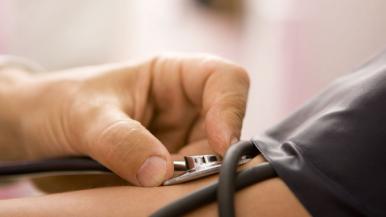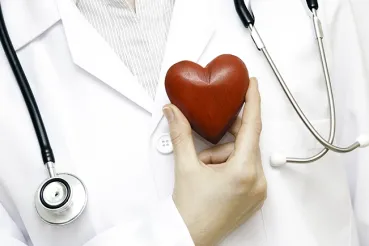There's a good reason why every doctor's appointment starts with a blood pressure check. While one in three American adults has high blood pressure, about 20% of people are unaware that they have it because it is largely symptomless.
In fact, most people find out they have high blood pressure during a routine office visit.
Blood pressure is the force of blood pushing against the walls of arteries as the heart pumps blood. High blood pressure, also referred to as hypertension, is when that force is too high and begins harming the body. If left untreated, it will eventually cause damage to the heart and blood vessels.
Your blood pressure is measured in two numbers: The top systolic blood pressure measures the force pushing against artery walls when the heart is contracting. The bottom diastolic blood pressure measures pressure in the arteries when the heart is resting between beats.
Normal blood pressure levels are 120 mmHg/80 mmHg or lower. At risk levels are 120-139 mmHg/80-89 mmHg. Readings of 140 mmHg/90 mmHg or higher are defined as high blood pressure.
Here are six other things you should know about high blood pressure.
1. Blood pressure is linked to other medical issues.
High blood pressure can be the first indication of a serious underlying condition. When a patient comes in with high blood pressure, doctors will check their urine and kidney function; do an electrocardiogram to check the size of the heart; and look for lung changes.
Stress on the blood vessels makes people with hypertension more prone to heart disease, peripheral vascular disease, heart attack, stroke, kidney disease and aneurysms. Correspondingly, chronic conditions such as diabetes, kidney disease, sleep apnea and high cholesterol increase the risk for developing high blood pressure.
In some women, pregnancy can contribute to high blood pressure, leading to preeclampsia. Postpartum blood pressure typically goes back to normal levels within six weeks. However, some women who have high blood pressure during more than one pregnancy may be more likely to develop high blood pressure and other cardiovascular diseases as they age.
Some of these medical issues can also cause spikes in high blood pressure (see below).
2. Lowering systolic blood pressure more may cut health risks.
One major study found that lowering systolic blood pressure to well below the commonly recommended level also greatly lowered the number of cardiovascular events and deaths among people at least 50 years old with high blood pressure.
When study participants achieved a systolic blood pressure target of 120 mmHg — compared to the higher target of 140 mmHg recommended for most people, and 150 for people over 60 — issues such as heart attack, stroke and heart failure were reduced by almost one-third, and the risk of death by almost one-fourth.
"That's important information, because more lives may be saved and more deaths may be prevented if we maintain lower blood pressure in certain patients," says Lynne Braun, NP, PhD, a nurse practitioner at the Rush Heart Center for Women.
Braun cautions, however, that your personal blood pressure target depends on a variety of things, including your current blood pressure, lifestyle, risk factors, other medications you are taking and your age. "Every person has to be evaluated as an individual," she says. "Realistically, we can't get everybody down to 120, and trying to do so may create unintended problems."
It can be dangerous, for instance, to keep an older person on medications that have unsafe side effects, such as diuretics (water pills), which can cause dehydration and dizziness in older adults.
And there can be other issues involved with taking multiple medications, such as cost and compliance.
Bottom line: If you have high blood pressure, talk to your doctor about what your target should be and how best to achieve it.
3. You shouldn't ignore white coat hypertension.
Some people experience white coat hypertension, when blood pressure is elevated in the doctor's office but not in other settings. These patients need to monitor their blood pressure at home or wear an ambulatory blood pressure monitor that takes your blood pressure every 30 minutes for 24 hours.
While white coat hypertension was formerly considered simple nervousness, recent research suggests otherwise.
A study published in the journal Hypertension found that people with white coat hypertension are at a significantly greater risk for developing sustained high blood pressure than people who have normal blood pressure. One possible explanation is that people with white coat hypertension have a harder time managing stress and anxiety.
People with high blood pressure and those at a high risk for developing hypertension, including adults over 50 and black men and women, should have no more than 1,500 milligrams of sodium daily (less than 3/4 tsp.) of salt.
4. Learning to cope with stress can help.
Stress and hypertension have often been linked, but researchers are still looking into a direct relationship between the two. Still, the best advice to hypertensive patients: Try to relax.
When you are stressed, your body sends stress hormones — adrenaline and cortisol — into the bloodstream. These hormones create a temporary spike in blood pressure, causing your heart to beat faster and blood vessels to narrow. When the stressful situation is over, blood pressure goes back to its normal level.
Chronic stress, however, may cause your body to stay in this highly-charged state longer than natural.
While stress itself may or may not affect blood pressure, how you cope with stress does. For instance, overeating, smoking and drinking alcohol in response to stressful situations are direct causes of sustained high blood pressure. On the flip side, healthier coping mechanisms like exercising, practicing yoga and meditating can all help lower blood pressure.
5. Good sleep can prevent and manage high blood pressure.
Most people experience a dip in blood pressure during the deepest stage of sleep (also known as slow wave sleep), which is the body's normal and healthy reaction to sleep. Not having that nighttime dip is a risk factor for heart disease and may increase daytime blood pressure.
Typically people spend 90 minutes to two hours in slow wave sleep per night. A recent study published in Hypertension found that men who got less slow wave sleep each night were a higher risk for hypertension than men who got more deep sleep.
While sleep disorders, like sleep apnea, and age can both affect the amount of deep sleep you get, there are steps you can take to ensure a good night's sleep. Getting seven to eight hours of sleep a night, maintaining a consistent sleep schedule and being more active during the day can help improve the quality of your sleep.
6. Excessive salt raises blood pressure.
Too much sodium can cause water retention that puts increased pressure on your heart and blood vessels. People with high blood pressure and those at a high risk for developing hypertension, including adults over 50 and black men and women, should have no more than 1,500 milligrams (mg) of sodium daily (less than 3/4 teaspoon) of salt.
Even people with normal levels should eat salt in moderation. Stick to no more than 2,300 mg of sodium (about one teaspoon of salt), per day.
Most dietary sodium comes from processed foods. Rules of thumb are to choose foods with 5% or less of the daily value of sodium per serving and opt for fresh poultry, fish and lean meats, rather than canned, smoked or processed. Similarly, fresh or frozen vegetables are better than canned.
A study published in the New England Journal of Medicine found that if people cut just 1/2 teaspoon of salt per day, it could help lower the number of new cases of heart disease per year by up to 120,000.
Further, potassium — found in foods like sweet potatoes, spinach, bananas, oranges, low-fat milk and halibut — can counterbalance the pressure-increasing effects of sodium by helping to rid the body of excess sodium.
Common causes of high blood pressure spikes
Some people with high blood pressure will experience sharp rises in their blood pressure. These spikes, which typically last only a short period of time, are also known as sudden high blood pressure. These are some possible causes:
- Caffeine
- Certain medications (such as nonsteroidal anti-inflammatory drugs) or combinations of medications
- Chronic kidney disease
- Cocaine use
- Collagen vascular disorders
- Overactive adrenal glands
- Pregnancy-related high blood pressure
- Scleroderma
- Smoking
- Stress or anxiety
- Thyroid issues (such as overactive or underactive thyroid gland)
If you have high blood pressure and experience the sudden onset of any of the following symptoms — which may signal a blood pressure spike or other serious condition — seek medical attention right away:
- Blurred vision
- Chest pain (angina)
- Headache
- Coughing
- Nausea or vomiting
- Shortness of breath (dyspnea)
- Weakness or numbness in your arms, legs, face (this can be a sign of stroke)
- Anxiety, fatigue, confusion or restlessness




